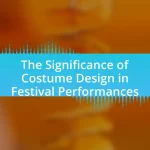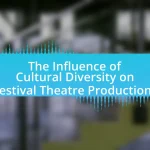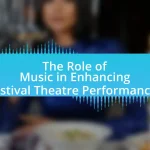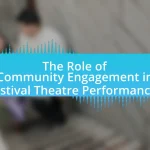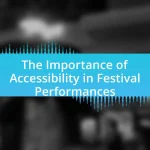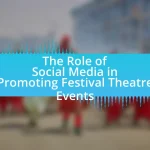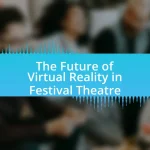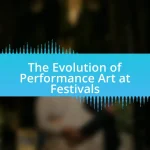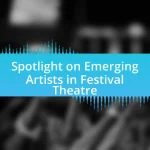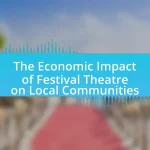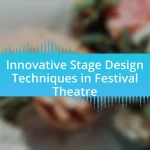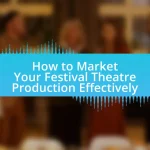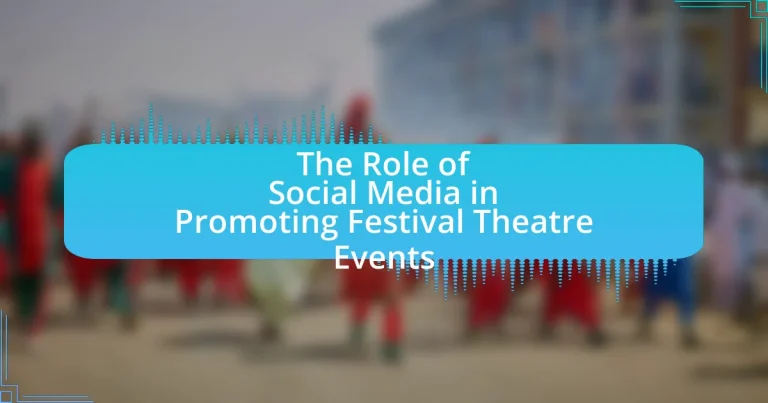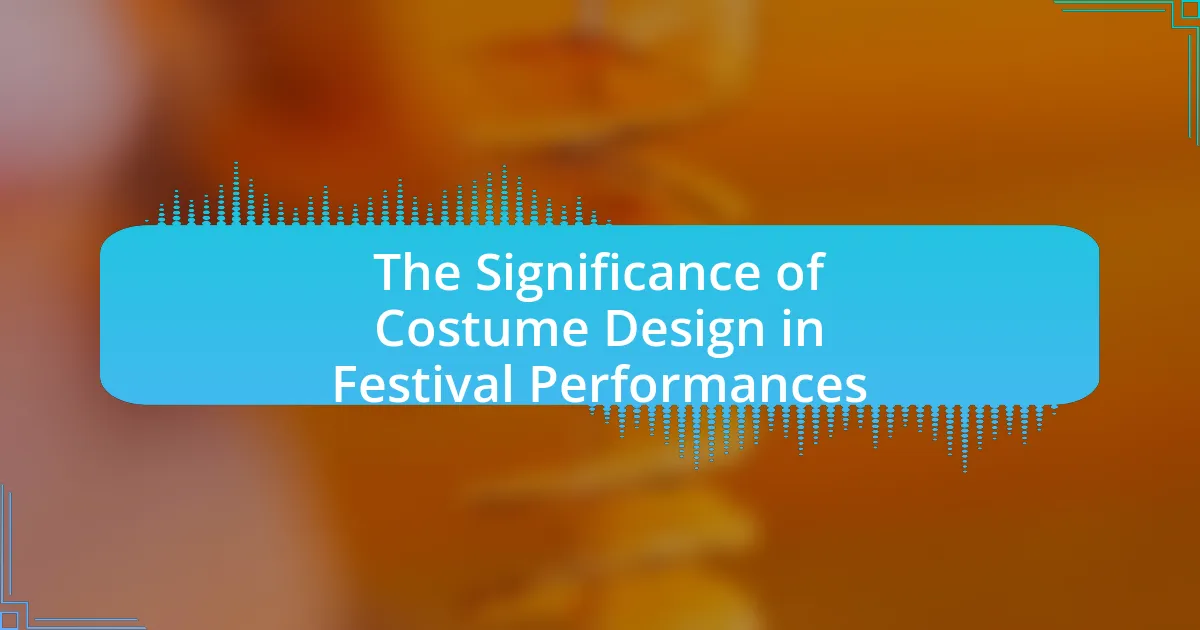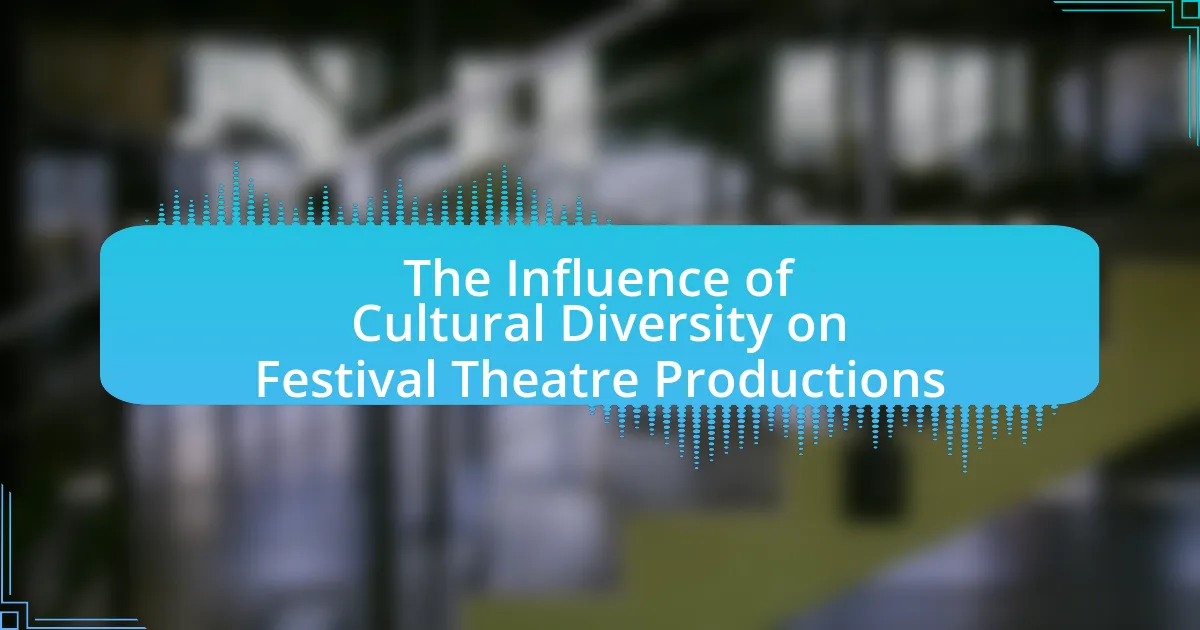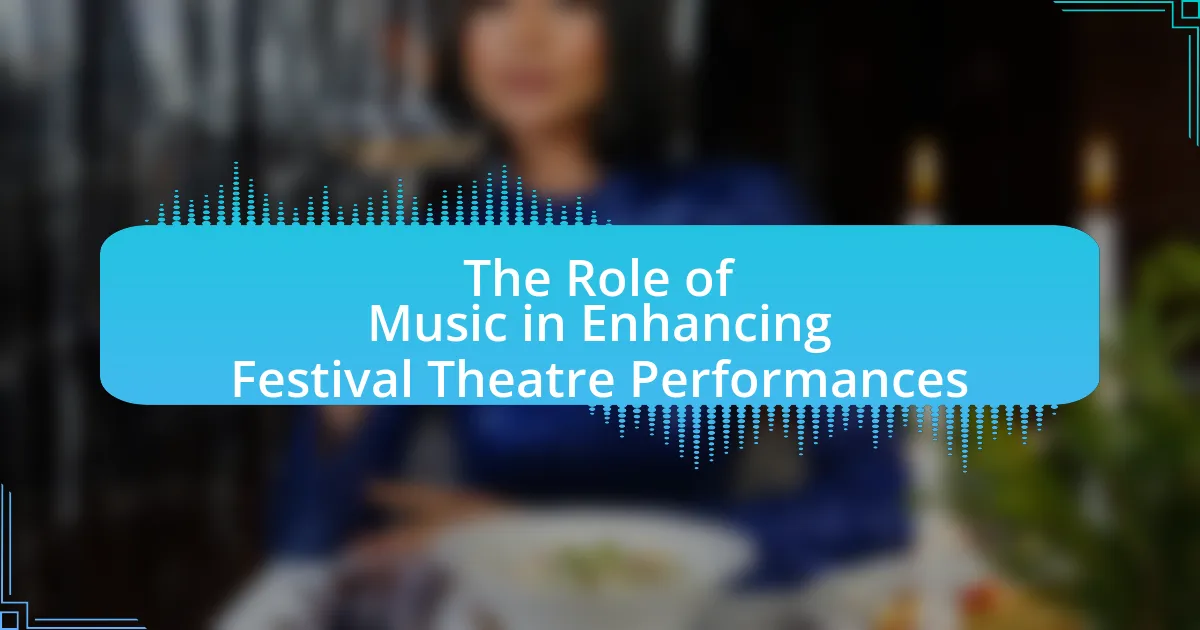The article examines the significant role of social media in promoting festival theatre events, highlighting its effectiveness in enhancing visibility and audience engagement. It discusses how platforms like Facebook, Instagram, Twitter, and TikTok cater to various demographics, enabling targeted advertising and real-time interaction. The article also outlines strategies for effective social media use, the advantages over traditional marketing methods, and the impact of user-generated content and influencers on audience perceptions and attendance. Additionally, it addresses challenges faced by festival organizers and offers best practices for leveraging social media to maximize promotional efforts.
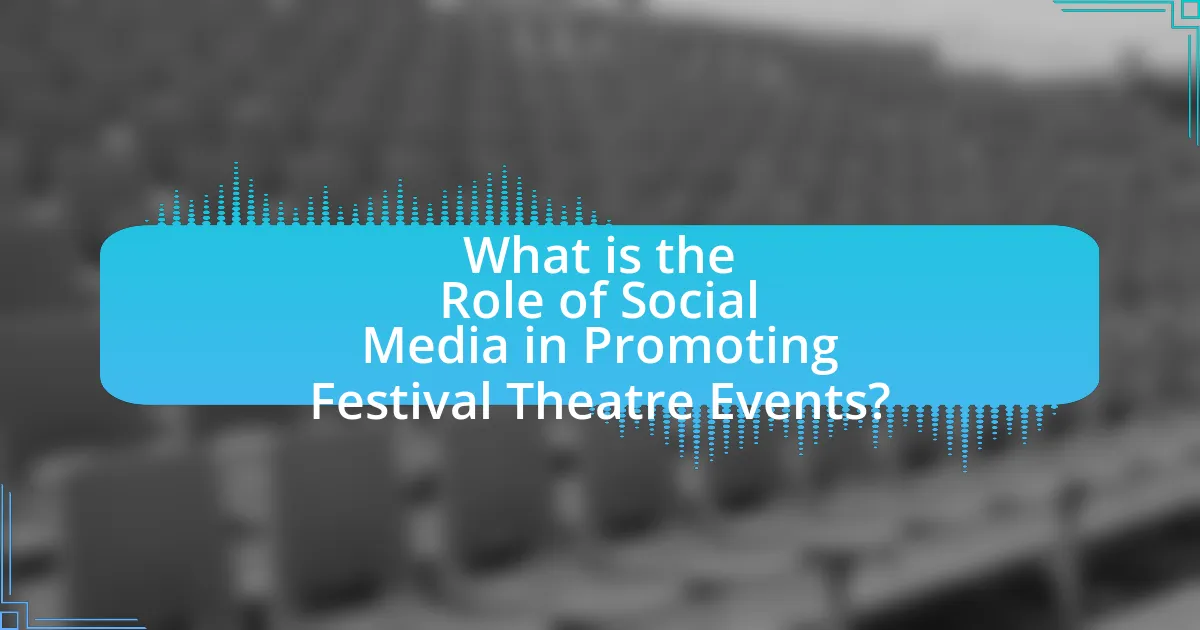
What is the Role of Social Media in Promoting Festival Theatre Events?
Social media plays a crucial role in promoting festival theatre events by providing a platform for widespread visibility and engagement. It allows festival organizers to reach diverse audiences quickly through targeted advertising, event pages, and organic posts. For instance, a study by the Pew Research Center indicates that 69% of adults in the U.S. use social media, making it an effective channel for reaching potential attendees. Additionally, social media facilitates real-time interaction, enabling audiences to share experiences, which can enhance word-of-mouth marketing. This interactive nature can lead to increased ticket sales and higher attendance rates, as evidenced by the success of festivals that actively engage their audiences online.
How has social media changed the landscape of festival theatre promotion?
Social media has transformed festival theatre promotion by enabling direct engagement between artists and audiences. This shift allows for real-time communication, fostering community interaction and increasing visibility for events. For instance, platforms like Instagram and Facebook facilitate targeted advertising, reaching specific demographics effectively; a study by the Pew Research Center in 2021 indicated that 69% of adults in the U.S. use social media, highlighting its vast reach. Additionally, user-generated content, such as audience reviews and shared experiences, enhances credibility and attracts new attendees, as seen in the success of festivals like Edinburgh Fringe, which heavily relies on social media for promotion.
What are the key social media platforms used for promoting festival theatre events?
The key social media platforms used for promoting festival theatre events are Facebook, Instagram, Twitter, and TikTok. Facebook is widely utilized for event creation and community engagement, allowing users to share event details and updates. Instagram serves as a visual platform, ideal for sharing promotional images and videos that capture the essence of theatre productions. Twitter facilitates real-time updates and interactions, making it effective for engaging with audiences and sharing news. TikTok, with its short-form video content, has gained popularity for creative promotions and reaching younger demographics. These platforms collectively enhance visibility and audience engagement for festival theatre events.
How do different platforms cater to various audience demographics?
Different platforms cater to various audience demographics by tailoring content, features, and advertising strategies to meet the preferences and behaviors of specific user groups. For instance, Facebook primarily targets a broad age range, including older adults, by offering community groups and event pages that facilitate local engagement, while Instagram focuses on younger audiences through visually appealing content and influencer partnerships that resonate with millennials and Gen Z. Additionally, TikTok engages a predominantly younger demographic with short, entertaining videos that encourage creativity and viral trends, making it ideal for promoting festival theatre events to a youthful audience. Research indicates that 71% of teens use Instagram, while 60% of users on TikTok are aged 16-24, highlighting the effectiveness of these platforms in reaching their respective demographics.
Why is social media important for festival theatre events?
Social media is important for festival theatre events because it enhances visibility and engagement with audiences. By utilizing platforms like Facebook, Instagram, and Twitter, festival organizers can reach a broader audience, promote ticket sales, and share real-time updates. For instance, a study by the Pew Research Center found that 69% of adults in the U.S. use social media, making it a crucial tool for connecting with potential attendees. Additionally, social media allows for interactive content, such as live streams and audience feedback, which fosters community involvement and increases the likelihood of repeat attendance.
What advantages does social media offer over traditional marketing methods?
Social media offers several advantages over traditional marketing methods, primarily through enhanced reach, engagement, and cost-effectiveness. Social media platforms allow for targeted advertising, enabling marketers to reach specific demographics based on interests, behaviors, and location, which is often more challenging with traditional methods like print or television. For instance, a study by Hootsuite in 2021 indicated that social media advertising can achieve a 25% higher engagement rate compared to traditional media. Additionally, social media provides real-time interaction, allowing brands to engage directly with their audience, gather feedback, and foster community, which traditional marketing lacks. Furthermore, the cost of running social media campaigns is generally lower than traditional advertising, making it accessible for smaller organizations and events.
How does social media enhance audience engagement and interaction?
Social media enhances audience engagement and interaction by providing platforms for real-time communication and feedback between event organizers and attendees. These platforms allow users to share experiences, post comments, and participate in discussions, which fosters a sense of community and belonging. For instance, studies show that events with active social media engagement see a 30% increase in audience participation, as users are more likely to attend when they feel connected to others through shared content and interactions. Additionally, features like live streaming and interactive polls further facilitate direct engagement, allowing audiences to influence event dynamics and feel more involved in the experience.
What strategies can be employed to effectively use social media for festival theatre promotion?
To effectively use social media for festival theatre promotion, organizations should implement targeted content strategies, engage with audiences through interactive posts, and utilize analytics for optimization. Targeted content strategies involve creating visually appealing promotional materials, such as videos and images, that highlight key performances and behind-the-scenes insights, which can increase audience interest and shareability. Engaging with audiences through interactive posts, such as polls, Q&A sessions, and live streams, fosters community involvement and enhances audience connection. Utilizing analytics tools, such as Facebook Insights or Twitter Analytics, allows organizations to track engagement metrics and adjust their strategies based on audience preferences and behaviors, ensuring that promotional efforts are data-driven and effective.
What types of content are most effective for promoting events on social media?
Visual content, particularly videos and images, is the most effective type of content for promoting events on social media. Research indicates that posts with visuals receive 94% more views than those without, making them crucial for engagement. Additionally, live videos generate six times more interactions than standard videos, highlighting their effectiveness in creating real-time engagement and excitement around events. Furthermore, user-generated content, such as testimonials and photos from past attendees, fosters community and trust, encouraging potential attendees to participate. These content types not only capture attention but also enhance shareability, increasing the reach of event promotions on platforms like Facebook, Instagram, and Twitter.
How can festival organizers measure the success of their social media campaigns?
Festival organizers can measure the success of their social media campaigns through key performance indicators (KPIs) such as engagement rates, reach, conversion rates, and audience growth. Engagement rates, which include likes, shares, and comments, indicate how well the content resonates with the audience. Reach measures the total number of unique users who see the posts, providing insight into the campaign’s visibility. Conversion rates track actions taken by users, such as ticket purchases or sign-ups, directly linked to social media efforts. Audience growth reflects the increase in followers or subscribers, showcasing the campaign’s effectiveness in attracting new attendees. These metrics provide concrete data that can be analyzed to assess the overall impact of social media strategies on festival attendance and engagement.
How does social media influence audience attendance at festival theatre events?
Social media significantly influences audience attendance at festival theatre events by enhancing visibility and engagement. Platforms like Facebook, Instagram, and Twitter allow event organizers to reach a broader audience through targeted advertising and organic sharing. For instance, a study by the University of Southern California found that 70% of attendees reported discovering events through social media channels, highlighting its effectiveness in driving ticket sales. Additionally, social media facilitates real-time interaction, enabling potential attendees to engage with content, share experiences, and receive updates, which can increase their likelihood of attending.
What role do influencers play in promoting festival theatre through social media?
Influencers play a crucial role in promoting festival theatre through social media by leveraging their large followings to create awareness and generate interest in events. They utilize platforms like Instagram, Twitter, and TikTok to share engaging content, such as behind-the-scenes footage, interviews with performers, and personal experiences, which can significantly enhance visibility and attract diverse audiences. Research indicates that 49% of consumers depend on influencer recommendations for their purchasing decisions, highlighting the effectiveness of influencers in driving ticket sales and attendance at festival theatre events.
How can user-generated content impact the perception of festival theatre events?
User-generated content significantly impacts the perception of festival theatre events by enhancing authenticity and engagement among audiences. When attendees share their experiences through photos, videos, and reviews on social media platforms, it creates a sense of community and trust, as potential visitors often rely on peer recommendations over traditional marketing. Research indicates that 79% of people say user-generated content highly impacts their purchasing decisions, demonstrating its effectiveness in shaping perceptions. Additionally, user-generated content can amplify the reach of festival theatre events, as shared posts can go viral, attracting a broader audience and increasing ticket sales.
What challenges do festival organizers face when using social media for promotion?
Festival organizers face several challenges when using social media for promotion, including content saturation, audience engagement, and platform algorithm changes. Content saturation occurs as numerous events compete for attention, making it difficult for any single festival to stand out. Audience engagement is another challenge, as organizers must create compelling content that resonates with diverse demographics while also encouraging interaction. Additionally, frequent changes in social media algorithms can limit the organic reach of promotional posts, requiring organizers to invest in paid advertising to maintain visibility. These factors collectively complicate the effectiveness of social media as a promotional tool for festivals.
How can negative feedback on social media be managed effectively?
Negative feedback on social media can be managed effectively by promptly acknowledging the feedback, responding professionally, and taking the conversation offline when necessary. Acknowledgment shows that the organization values customer opinions, which can mitigate negative sentiments. For instance, a study by the Harvard Business Review found that companies that respond to negative reviews can improve their overall ratings by up to 33%. Additionally, providing a solution or offering to discuss the issue privately can demonstrate commitment to customer satisfaction and help resolve the situation constructively.
What are the common pitfalls to avoid in social media marketing for festival theatre?
Common pitfalls to avoid in social media marketing for festival theatre include neglecting audience engagement, failing to tailor content for specific platforms, and not analyzing performance metrics. Audience engagement is crucial; ignoring it can lead to decreased interest and attendance. Each social media platform has unique characteristics and user demographics, so using the same content across all platforms can result in ineffective communication. Additionally, not analyzing performance metrics prevents marketers from understanding what strategies work, leading to repeated mistakes and wasted resources. For instance, a study by Hootsuite found that brands that engage with their audience see a 20% increase in customer loyalty, highlighting the importance of interaction in social media marketing.
What are the best practices for leveraging social media in festival theatre promotion?
The best practices for leveraging social media in festival theatre promotion include creating engaging content, utilizing targeted advertising, and fostering community interaction. Engaging content, such as behind-the-scenes videos and interviews with performers, captures audience interest and encourages sharing. Targeted advertising on platforms like Facebook and Instagram allows promoters to reach specific demographics, increasing ticket sales; for instance, Facebook reports that businesses earn an average of $4.00 for every $1.00 spent on ads. Additionally, fostering community interaction through live Q&A sessions and user-generated content builds a loyal audience and enhances word-of-mouth promotion, which is crucial for festival success.
How can festival organizers create a cohesive social media strategy?
Festival organizers can create a cohesive social media strategy by establishing clear goals, defining target audiences, and maintaining consistent branding across platforms. Clear goals, such as increasing ticket sales or enhancing audience engagement, guide content creation and scheduling. Defining target audiences allows organizers to tailor messages and select appropriate platforms, ensuring effective communication. Consistent branding, including visual elements and tone of voice, reinforces recognition and trust among followers. Research indicates that cohesive branding can increase customer loyalty by up to 23%, highlighting the importance of a unified approach in social media strategies.
What tools and resources can assist in managing social media campaigns for events?
Tools and resources that assist in managing social media campaigns for events include social media management platforms, analytics tools, and content creation resources. Platforms like Hootsuite and Buffer enable users to schedule posts, monitor engagement, and manage multiple accounts efficiently. Analytics tools such as Google Analytics and Facebook Insights provide valuable data on audience behavior and campaign performance, allowing for data-driven adjustments. Additionally, content creation resources like Canva and Adobe Spark facilitate the design of visually appealing graphics and promotional materials, enhancing the overall effectiveness of social media campaigns. These tools collectively streamline the management process, improve engagement, and optimize campaign outcomes.
What future trends should festival theatre organizers consider in social media promotion?
Festival theatre organizers should consider the increasing importance of video content and live streaming in social media promotion. As platforms like Instagram and TikTok prioritize video, engaging short-form content can capture audience attention more effectively than static images or text. According to a report by Cisco, video will account for 82% of all internet traffic by 2022, highlighting its significance in digital marketing strategies. Additionally, the rise of augmented reality (AR) features on platforms such as Snapchat and Instagram can enhance audience interaction and create immersive experiences, making events more appealing. Embracing these trends will allow festival theatre organizers to reach wider audiences and foster deeper engagement.
How might emerging technologies impact social media marketing for festivals?
Emerging technologies will significantly enhance social media marketing for festivals by enabling more personalized and immersive experiences. For instance, the integration of artificial intelligence allows for targeted advertising based on user behavior and preferences, increasing engagement rates. Additionally, augmented reality can create interactive promotional content that captivates potential attendees, as seen in campaigns by major festivals like Coachella, which utilized AR filters to boost user interaction on platforms like Instagram. Furthermore, advancements in data analytics provide insights into audience demographics and preferences, allowing festival organizers to tailor their marketing strategies effectively. These technologies collectively improve outreach, engagement, and conversion rates in festival marketing efforts.
What shifts in audience behavior should be anticipated in the coming years?
In the coming years, audiences are expected to increasingly prioritize digital engagement and personalized experiences in their interactions with festival theatre events. This shift is driven by the growing reliance on social media platforms for discovering and engaging with cultural content, as evidenced by a 2022 survey indicating that 70% of younger audiences prefer to learn about events through social media channels. Additionally, audiences are likely to demand more interactive and immersive experiences, as trends show that events incorporating augmented reality and live streaming have seen a 50% increase in attendance. This evolution in behavior reflects a broader societal trend towards digital integration and personalization in entertainment consumption.
What practical tips can enhance social media promotion for festival theatre events?
To enhance social media promotion for festival theatre events, utilize targeted content strategies that engage specific audience segments. Creating visually appealing posts, such as behind-the-scenes videos and high-quality images of performances, can significantly increase audience interest and sharing rates. According to a study by Sprout Social, posts with images receive 650% higher engagement than text-only posts. Additionally, leveraging event-specific hashtags can improve discoverability, as research shows that tweets with hashtags receive 33% more engagement. Collaborating with local influencers to promote the event can also expand reach, as influencer marketing can yield an ROI of $5.78 for every dollar spent. Finally, scheduling posts at optimal times based on audience analytics can maximize visibility, as studies indicate that posts made during peak engagement hours can lead to a 20% increase in interactions.
